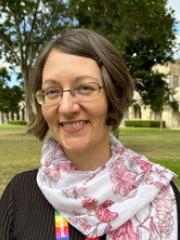Dr Laura Grogan

Researcher biography
(she/her)
Dr. Laura Grogan is a qualified veterinarian, Senior Lecturer in Wildlife Science and Leader of the Biodiversity Health Research Team (https://www.biodiversity-health.org/) - a collaborative multiple-university research group focused on finding sustainable solutions for the most challenging threatening processes currently affecting biodiversity.
Dr. Grogan has a background in research on wildlife diseases, ecology and conservation. She's particularly interested in investigating the dynamics, relative importance, and impacts of infectious diseases among other threats affecting wildlife across both individual and population scales, to improve conservation management.
While she works across taxa and methodological approaches, her main study system currently involves the devastating amphibian fungal skin disease, chytridiomycosis, where at the individual scale she focuses on the pathogenesis and amphibian immune response to the disease, untangling the roles of resistance and tolerance in defense against infection. At the population and landscape scale she explores mechanisms underlying persistence in the face of endemic infection, focused on the endangered Fleay's barred frog. She also studies population and infection dynamics of chlamydiosis in koala using a mathematical modelling approach, exploring the relative benefits of different management approaches. In addition to working on amphibian and koala diseases, Laura is a keen birdwatcher, wildlife photographer and artist. She supervises projects across wildlife-related fields (predominantly vertebrates).
You can find out more about her research team here: www.biodiversity-health.org.
Dr. Grogan has been awarded around $1.3 million in research funding since 2018. In late 2019 she was awarded an Australian Research Council Discovery Early Career Researcher Award (DECRA; DE200100490), worth $426,742. This project, titled "Understanding infection tolerance to improve management of wildlife disease", commenced in late 2020. Dr. Grogan was identified as one of the four top-ranked science DECRA awardees by the Australian Academy of Science's 2020 J G Russell Award, and was also recipient of the highest award of the Wildlife Disease Association Australasia Section with their 2019 Barry L Munday Recognition Award.
PhD and Honours projects are now available in the following areas (plus many more areas - please get in touch if you have an idea):
- Can frogs be 'vaccinated' by antifungal treatment of active infections to develop protective immunity to the devastating chytrid fungus? (Principal Supervisor)
- Establishing the conservation status of south-east Queensland's amphibians - occupancy surveys and species distribution models (Principal Supervisor)
- Tadpoles as a reservoir of the lethal frog chytrid fungal disease – measuring sublethal effects on growth, time to metamorphosis and ability to forage (mouthpart loss) (Principal Supervisor)
- Impacts of chytrid fungus on the survival of juvenile endangered Fleay's barred frogs, Mixophyes fleayi, and importance for population recruitment (Principal Supervisor)
- Measuring the infection resistance versus tolerance of barred frogs to the devastating chytrid fungal disease to improve management outcomes (Principal Supervisor)
- Mapping the impacts of fire-fighting chemicals on endangered frog habitats (Co-Supervisor)
- Bowra birds: what do long-term monitoring data reveal about bird communities in the semi-arid region? (Co-Supervisor)
- Impacts of fire-fighting chemicals on endangered frogs: Implications for conservation and management (Co-Supervisor)
